
So this month I was curled into my usual fetal position wondering how to make good things happen without moving at all, when I came upon a thought. The thought was this: Since the energy of every effort creates a result in the same general zone of energy, my usual habit of working throughout most of every day was generating a great deal of what we might call “energetic fertilizer” (in other words, poop). I was trained for years to work myself to the point of feeling pooped, and I am very good at it. But who, I thought, wants to buy pooped energy? It seems we all generate plenty of that on our own. What I wanted was more energy of fun. I presume this is also what many of my customers and clients want. I decided to run an experiment. I decided that for two weeks—the final two weeks of April–I would dedicate myself not only to feeling passively well, but to having fun. Radical fun.
Author and journalist Joshua Foer, who trained as a competitive memorizer (of all things), writes about something called the OK Plateau. That’s the place where things are going well enough that we can stumble along fairly well without needing to improve anything. I have spent years on the OK Plateau when it comes to having fun. I have found that many clients report the same tendencies. When life gets to OK they stop thinking about things like fun. The challenge of radical fun is to take those OK experiences and make them delightful. We tend to assume that this is the result of laziness and selfishness, and that we would all do it automatically if we weren’t so disciplined and virtuous.
What I’ve discovered during radical fun month is that fun is a skill. Most of us are terrible at it. We immediately turn to tired stereotypes, clichés like sleeping on the beach, drinking, eating too much, and spending a lot of money. I have nothing against these activities, but they’re pathetic attempts at creating genuine exuberant joyful feelings. When I ask clients to reward themselves for difficult achievements they find that coming up with the reward is harder for them than the achievement itself. So right now, I’d like you to turn your attention to finding or creating a fun experience for yourself. Do this in the knowledge that the energy of fun will fuel your productivity in every area of your life–and also that any activity in your life is only worth doing if it facilitates the experience of joy.
First question, Are you tired? When you are tired no significant effort is fun. The clichés I’ve just mentioned (the beach, the drinking, etc.) exist largely because most of us are significantly sleep deprived. If your answer to this question is yes, you must–I said must–aggressively create opportunities to rest and act on them.
When you are no longer tired you can ask the second question: What did you do for fun as a child? Our fun preferences appear very early in our lives and tend to remain extremely stable over time. What was fun for you at age 2 will probably be the most fun you can have at 92. For me, one obvious answer to this question was reading. I learned to read very young and stopped only under extreme duress. However, my literacy was turned into work, first by my education and then by choosing a career as a writer. I realized that I frequently slip into the bad habit of reading only for work and not for pleasure. So just reading wasn’t enough fun for me. I needed to read something pointless, non-work-related, and highly entertaining. Thank you Hunger Games. By jumping into young adult fantasy fiction, I yanked myself right off the OK Plateau and into some radical fun. For you, reading may not be fun at all. DO NOT JUDGE YOURSELF. Just look back on your childhood and find what you did when no one was forcing you. Did you climb trees? Did you play computer games? Did you build forts? Did you dress in a ninja outfit and hide in the closet of your best friends bedroom? Don’t do that—it isn’t legal. But find an alternative based on the original fun experience.
The fabulous thing about returning to childhood pleasures is that you now have things like computers, cars, and the ability to purchase or barter for experiences to which you had no access as a child. If you liked playing hide-and-seek as a kid you can now go with your friends to a paintball maze and have a radically fun experience. If you liked to pretend you were a famous singer you can get voice lessons, then have your spouse film you using nothing but a phone and reach your fans online. This is the age when magical technologies make more and more radically fun ideas plausible, even easy. You’re only limited by your creativity and the OK Plateau.
Since I started my radical fun experiment, ridiculously positive things have been happening. I’ll tell you about them next month if they all pan out (some of them are still in process). But right now I’m telling you, according to this experimental sample of one, radical fun leads to radical positive results which seem to have nothing to do with the new fun games you are playing. Fun creates more fun. This month, insist on it.










26 comments
AT 1:57 PM
AT 6:49 AM
AT 4:17 PM
AT 7:39 AM
AT 6:12 PM
AT 9:48 PM
AT 10:43 PM
AT 6:55 AM
AT 3:33 PM
AT 6:11 AM
AT 2:23 PM
AT 6:51 AM
AT 10:25 AM
AT 8:46 AM
AT 11:29 AM
AT 9:46 PM
AT 10:25 AM
AT 12:57 PM
AT 7:04 AM
AT 8:41 AM
AT 12:47 PM
AT 6:35 PM
AT 5:14 AM
AT 6:02 AM
AT 10:05 AM
AT 11:29 AM